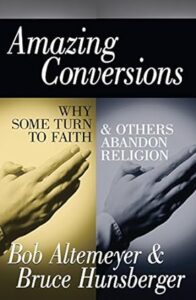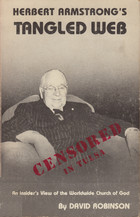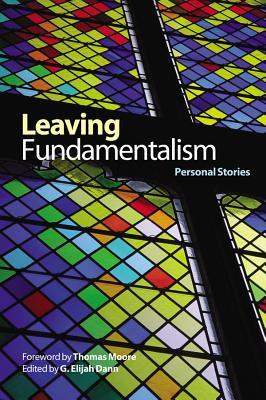 This post is directed to those who presume an anti-religious in any atheist who has left a religious past, especially one that was strict and authoritarian, and who arrives at views about the Bible and Christian origins that are at odds with the “conventional wisdom” of mainstream biblical scholars.
This post is directed to those who presume an anti-religious in any atheist who has left a religious past, especially one that was strict and authoritarian, and who arrives at views about the Bible and Christian origins that are at odds with the “conventional wisdom” of mainstream biblical scholars.
The stereotypical apostate from a deeply religious upbringing is said to “hate” their former religion and will be biased against it to such an extent that they will seek to undermine whenever the opportunity arises. “Once a fundamentalist always a fundamentalist” — only in the reverse direction — is a refrain that I have heard often enough from defenders of mainstream scholarship when they dismiss arguments that come from known “apostates”. I think that refrain is a lazy substitute for attempting to engage with the intellectual content of the criticisms whenever they are raised. If the apostate was once a member of a rigid, authoritarian or other kind of fundamentalist or cultish sect, then it is reasonable (the mainstream scholar’s thinking goes) to assume that the apostate is now just as brainwashed or closed-minded as ever, only now in a vengeful reaction against their former faith.
Is there evidence to support that portrayal of apostates?
Most people I have known personally who have left authoritarian cults have not the slightest interest in even thinking about their religious experiences. Those apostates are glad to engage in an entirely new life free from any reminders of that past. But that’s me — and I am merely one person’s anecdotal testimony and hearsay report.
It happens that right now I am reading a book for the purpose of reviewing it here and as early as page 31 I found myself pulled up and in dire need to to track down and skim another work that was cited on that page. Here’s what pulled I read:
Citing Burton Mack, Ellegård notes that the biblical scholar/theologian community has pretty much ignored this type of work, especially that of Wells. It’s not a surprise that Wells’s work has been subjected to rather vehement criticism from biblical scholars, some of whom accuse him of ‘anti-religious’ intentions.104
104 It always surprises me to note that many biblical scholars frequently accuse other scholars – some of them also biblical specialists – of ‘anti-religious’ intentions in their work. It’s a strange form of conspiracy theory which posits that a desire for, and search for, truth is somehow blasphemous. Canadian social psychologists Bob Altemeyer and Bruce Hunsberger, in their book Amazing Conversions, studied the phenomenon and determined that it was the inculcation of the religious attitude that there is truth, and that it should be diligently sought, that disposes deeply honest people to turn that inquiry on their own beliefs. Bob Altemeyer and Bruce Hunsberger, Amazing Conversions: Why Some Turn to Faith & Others Abandon Religion (Prometheus Books, 1997)
From page 31 of Knight-Jadczyk, Laura. From Paul to Mark: PaleoChristianity. Red Pill Press, 2021. . Link is to a publicly available copy of the book at archive.org.
How had I missed Amazing Conversions given my zeal in seeking out and devouring that kind of book back in the late 1990s/early 2000s!
So now that I’ve caught up with Amazing Conversions, I’ll share some of its key findings on the way apostates from strict religious backgrounds approach anyone who presents as an inquirer into the truth about their religion. Surely an apostate’s attitude towards such a person tells us something meaningful about the likelihood that they might be reflexively predisposed to bias against establishment religions.
Amazing Conversions describes and discusses a 1995 study into persons who, contrary to the expectations we would have from their upbringing, became either apostates or devout believers.
This book hopes to provide some explanation of these two exceptional kinds of persons: individuals who — against the influences of their past and all the socialization theories in the world — swam against the tide and became, respectively, “Amazing Apostates” and “Amazing Believers.” It presents our research on rare persons who changed so mightily that they “crossed over” and became each other’s destiny. It tries to understand how such remarkable transformations could take place. (p. 12)
Who was selected for the study?
Most of these apostates had pretty nonreligious upbringings, and so their subsequent loss of belief does not come as a surprise. But a few — a very few came from relatively intensive religious backgrounds, and that is amazing. So we rounded up as many “Amazing Apostates” as we could and talked with them.
. . . .
We selected, as potential Amazing Apostates . . . all students who scored in the top quartile on the Religious Emphasis scale, and yet scored in the bottom quartile on the
Christian Orthodoxy scale.Such persons proved quite rare. In 1994, eighteen were filtered out of 1,457 students who answered the screening booklet at the University of Manitoba. Fifteen turned up among 813 Wilfrid Laurier University students. In 1995, the figures were just 11/1,070 in Manitoba and 14/924 at Wilfrid Laurier. That works out to 1.4 percent of the sample being potential Amazing Apostates. We had to screen over 4,000 students to locate 58 of these rare beings. (pp 21, 26f of Amazing Conversions)
So this sample of 58 had travelled the road “from a strong religious childhood to religious disbelief”.
The question of particular interest here
Next we asked the AAs [=Amazing Apostates] to imagine that a younger member of their home religion came to them for advice. Religion had played a big role in this person’s life, but now questions were arising. This person wanted advice on what to do. What would they say? (p. 29)
I quote here the various descriptions of the responses to that question: Continue reading “Are Apostates a Threat to Believers?”








